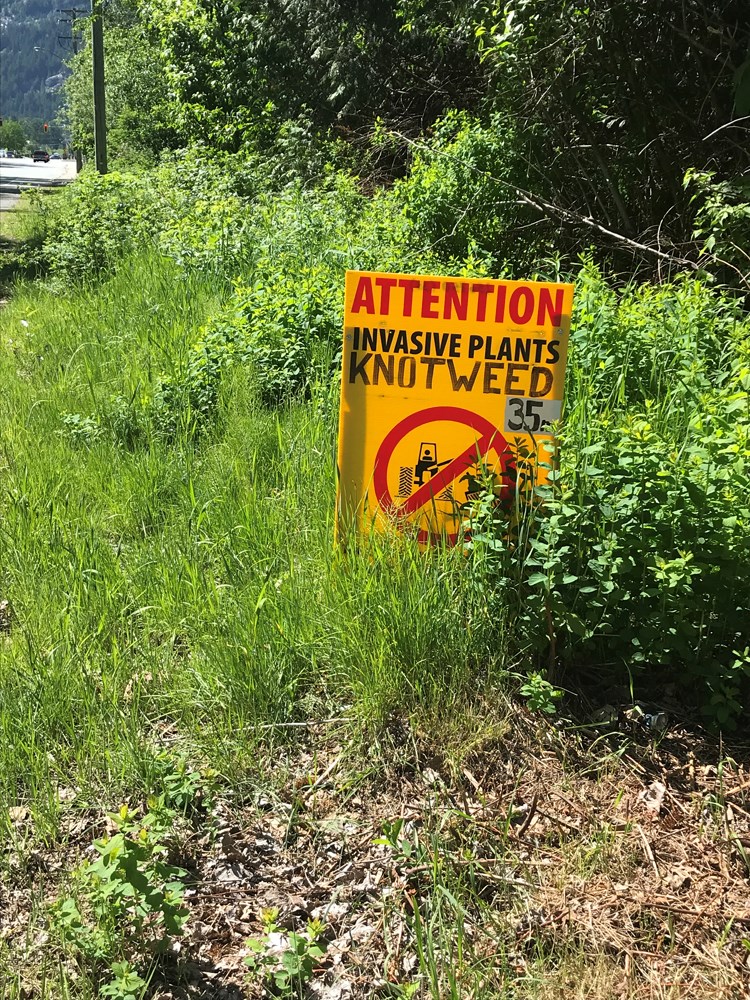The use of a controversial chemical in certain herbicides being sprayed around Squamish is drawing concern from some locals.
Glyphosate, a chemical that has been banned in some areas, is being used by the District and CN Rail to crack down on invasive species such as knotweed.
While Health Canada has approved its use, glyphosate continues to be a lightning rod for debate.
Los Angeles, Miami, and other communities have banned the use of the chemical. It's also been the subject of high-profile legal action. In California, a couple was awarded $2 billion after alleging it caused their cancer.
Here in Canada, a Saskatchewan farmer is leading a class-action lawsuit against a manufacturer Bayer and Monsanto, which are respectively the current and former owners of Roundup. Roundup is a popular herbicide that contains glyphosate.
Back in Squamish, some residents have expressed worry that the local use of glyphosate could be harmful to residents, especially children.
"I think if it's toxic enough for other states and other countries to ban it, and if it's killing bees and if people are getting sick from it, then it needs to be banned altogether," said Squamish mom Christa McConachie.
A recent study by the University of Texas at Austin suggests that glyphosate destroys gut bacteria in bees, making them vulnerable to infection and even death from harmful bacteria.
McConachie said that cancer may be tied to the herbicide, noting the high-profile legal action involving the chemical.
She noted she was especially concerned, given that her two-year-old daughter has neuroblastoma, a type of cancer that forms in certain types of nerve tissue, though she said she was unsure if herbicide was the cause.
McConachie also said she was worried that authorities might be spraying near blackberry bushes, which could contaminate the plant.
Some residents have voiced concern that people might eat berries that have inadvertently had contact with the chemical.
For its part, the District of Squamish says that the Sea to Sky Invasive Species Council does the spraying around town.
District spokesperson Christina Moore said that glyphosate is in some of the herbicides the invasive species council uses to kill Japanese knotweed, but the chemicals are not broadcasted over a large area.
"Due to the potentially devastating impacts of this invasive species and the difficulty in manually controlling its spread, herbicide stem injections and spot spraying are used in strategic locations where there are threats to sensitive habitat or infrastructure," Moore wrote in an email.
She added that blackberry bushes are not sprayed with herbicides, as a manual removal method is used instead.
The District of Squamish does not apply herbicides or pesticides in our parks or for Public Works purpose, she said.
Finally, with respect to blackberries, Moore said wild blackberries on District land are not sprayed with herbicides, and they are generally considered safe to eat.
However, Moore said she couldn't comment with respect to blackberries growing on private land.
She also noted that other pollutants such as car fumes could affect blackberries.
Clare Greenberg, who heads the Sea to Sky Invasive Species Council, said the court case in U.S., which has gathered much attention stems from a different use of glyphosate.
"It's more about the agricultural uses of glyphosate," said Greenberg. "So glyphosate being sprayed on crops... for farming and what people eat."
"This is a completely different application," she said, referring to the work being done in Squamish. "We're talking about spot-spraying of invasive plants, not broadcast spraying."
She added that Health Canada has cleared glyphosate for use.
In a re-evaluation decision on glyphosate made in 2017, Health Canada's Pest Management Regulatory Agency said the chemical "is not genotoxic and is unlikely to pose a human cancer risk."
"Dietary — food and drinking water — exposure associated with the use of glyphosate is not expected to pose a risk of concern to human health," reads the decision.
"Occupational and residential risks associated with the use of glyphosate are not of concern, provided that updated label instructions are followed."
Greenberg noted that United States' Environmental Protection Agency has also cleared glyphosate as safe.
She also said that herbicides, while harmful to plants, aren't necessarily harmful to animals and humans.
"The key thing to understand, too, is that the active ingredient in herbicides affect enzymes that only plants have. So, in terms of effects on humans, they don't affect animal systems, they affect plant systems," said Greenberg.
"The enzymes that those herbicides target — humans don't have those enzymes."
She said it's important to crack down on knotweed because it outcompetes all other native plants and destroys the ecological diversity in the area.
This could result in problems such as surface runoff, as knotweed doesn't have roots that bind the soil, Greenberg said.
The results could harm salmon habitats, as the fish need gravelly areas to spawn, she said.
"It doesn't support the rest of the ecosystem," Greenberg said.
This could harm wildlife and birds, she said.
CN Rail has also begun removing weeds in Squamish as of June 3 as part of its annual vegetation management program.
"If not managed properly, trees, brush or other vegetation can severely compromise public safety, including by impeding the view motorists have of incoming trains, increasing the risk of crossing accidents. Moreover, unwanted vegetation can damage the integrity of the railway, increasing the risk of incidents, interfere with signals and switches, contribute to trackside fires, compromise employee safety, reduce visibility for train crews at road crossings, of signals and other trackside warning devices, to name only a few risks," reads a letter to Squamish council.
Removing vegetation can include the use of sprays that have glyphosate.
The company said that CN only uses pesticides approved in Canada and the province where they're applied. They pointed to Health Canada's approval of the glyphosate.



